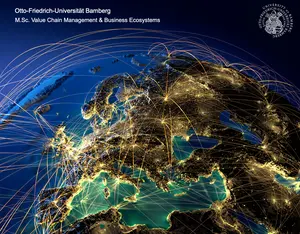Profile
Value Creation and Management in Industrial Markets
Transactions between industrial companies are the backbone of the global economy. They represent a significant portion of the economic performance in the national accounts of most countries. Examples include the purchase of raw materials by the food industry, the purchase of parts and components by automotive manufacturers, or the purchase of production or packaging machines by the pharmaceutical industry.
Industrial companies encompass various types of firms, from small startups to medium-sized businesses and large corporations. Their activities are closely interlinked within value creation in professional markets (known as business-to-business markets). This results in complex value chains or value networks (in English: value chains or business ecosystems).
Network-like business ecosystems also emerge because industrial companies require a variety of professional services for efficient and effective value creation. These services include transport, finance, information, consulting, storage, insurance, and other services essential for the value creation process.
Many large German companies, such as Siemens, Schaeffler, or Brose from the North Bavaria region, as well as medium-sized businesses with their many "hidden champions," operate within professional value chains or business ecosystems. All of these companies generate significant portions of their revenue from business customers. They must determine their own position and value contribution within the larger business ecosystem in which they operate. To do this, they define their business model, enter strategic partnerships with partners, and seek appropriate supply chains.
Managing such professional networks poses specific demands on management at all levels, namely a consistent focus on the coordination and optimization of value creation processes in professional value chains and business ecosystems.
The Master's Program in Value Chain Management & Business Ecosystems
The teaching and learning concept of the M.Sc. VCM&BE is based on our understanding of industrial value creation as a comprehensive task that requires both intra-company integration of various functional areas and inter-company integration of actors from different industries and value creation stages. It includes aspects of procurement, logistics, production, innovation management, business informatics, service management, work design and HR management, business-to-business sales and marketing, as well as overarching strategic analysis and planning.
In a specialized economy, value is created by a single company (operation) by acquiring goods and services from other companies at a certain price (value) (input), using these goods and services along with its own resources and in collaboration with suitable partners to produce new goods and services (output), and selling these at a higher price (value) in the market. Value creation is based on intra-company and inter-company processes. Employees are responsible for these processes, which in turn receive support from suitable technologies. Therefore, our holistic teaching and learning concept is based on three pillars, which together form a research-oriented study program for a 'Master of Science':
Enabling Processes: The individual courses aim to enable students to design, plan, control, and monitor value creation processes, value creation process chains, and entire value creation networks or business ecosystems in a targeted manner.
Enabling Technology: To plan, control, and monitor value creation processes and ensure their efficient execution, appropriate technologies must be used. Students are taught practical application skills, particularly through a close link with content from information technology and business informatics.
Enabling People: Ultimately, people are at the center as decision-makers, planners, buyers, negotiators, innovators, and designers. Therefore, the program includes courses on leadership, HR management, and modern work environments.
Whether you pursue an academic career or a career in practice, our master's program allows you to position yourself for your path. Our specialized study counseling is happy and competent to help you with your planning.
Source photo: Colourbox
